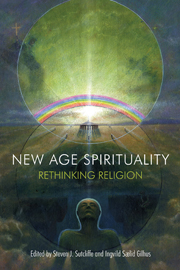Book contents
- Frontmatter
- Contents
- Introduction: “All mixed up” – thinking about religion in relation to New Age spiritualities
- Part I Rethinking New Age spiritualities
- 1 New Age, world religions and elementary forms
- 2 “All over the place”: the contribution of New Age to a spatial model of religion
- 3 Towards a new paradigm of constructing “religion”: New Age data and unbounded categories
- 4 On transgressing the secular: spiritualities of life, idealism, vitalism
- 5 Hiding in plain sight: the organizational forms of “unorganized religion”
- Part II Comparing New Age beliefs and practices
- Part III Putting new spiritual practices to work
- Conclusion: New Age spiritualities – “good to think” in the study of religion
- Contributors
- Further reading
- Bibliography
- Index
4 - On transgressing the secular: spiritualities of life, idealism, vitalism
from Part I - Rethinking New Age spiritualities
- Frontmatter
- Contents
- Introduction: “All mixed up” – thinking about religion in relation to New Age spiritualities
- Part I Rethinking New Age spiritualities
- 1 New Age, world religions and elementary forms
- 2 “All over the place”: the contribution of New Age to a spatial model of religion
- 3 Towards a new paradigm of constructing “religion”: New Age data and unbounded categories
- 4 On transgressing the secular: spiritualities of life, idealism, vitalism
- 5 Hiding in plain sight: the organizational forms of “unorganized religion”
- Part II Comparing New Age beliefs and practices
- Part III Putting new spiritual practices to work
- Conclusion: New Age spiritualities – “good to think” in the study of religion
- Contributors
- Further reading
- Bibliography
- Index
Summary
The context of this chapter is set by two major schools of thought. On the one hand, it is argued that the secularization of Christianity ends with the secular, a condition that is self-sufficient. Émile Durkheim ([1912] 1971), Steve Bruce (2002) and David Voas (2009) are among those who argue the case. On the other, there is the argument that the secular is insufficient. Insufficiencies generate transgressions of the secular condition; movement into the non-secular. A hegemonic secular age is but a pipe dream. Among others, Georg Simmel (1997), Peter Berger (1999) and Charles Taylor (2007) argue along these lines.
The incontestable marginalization of Christianity means that it is now possible to test the idea that the outcome of the decline of Christianity is a self-sufficient secular age; and the opposite idea that insufficiencies of the secular generate sufficient transgression to prevent the advent of a secular age; and to promote “alternative” spiritualities.
Rather than providing a review of all the evidence that counts for and against the two arguments, the aim of this chapter is to strike at the very heart of the idea of self-sufficiency. In face of the evidence supporting the self-sufficiency argument – most noticeably the collapse of Christianity and corresponding movement into the secular – the aim is pursued by arguing that secular sources of motivation are currently in operation.
- Type
- Chapter
- Information
- New Age SpiritualityRethinking Religion, pp. 66 - 83Publisher: Acumen PublishingPrint publication year: 2013



